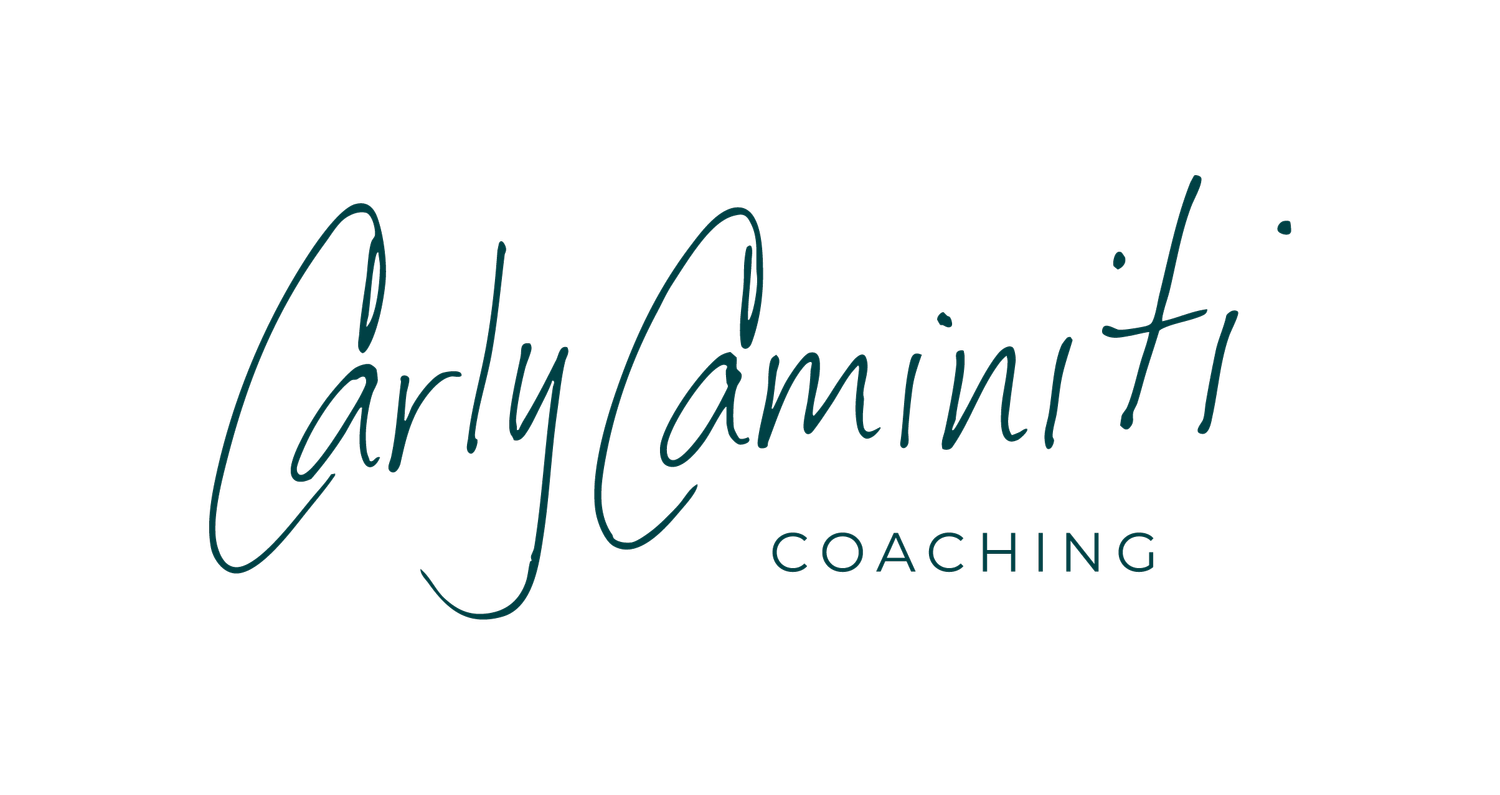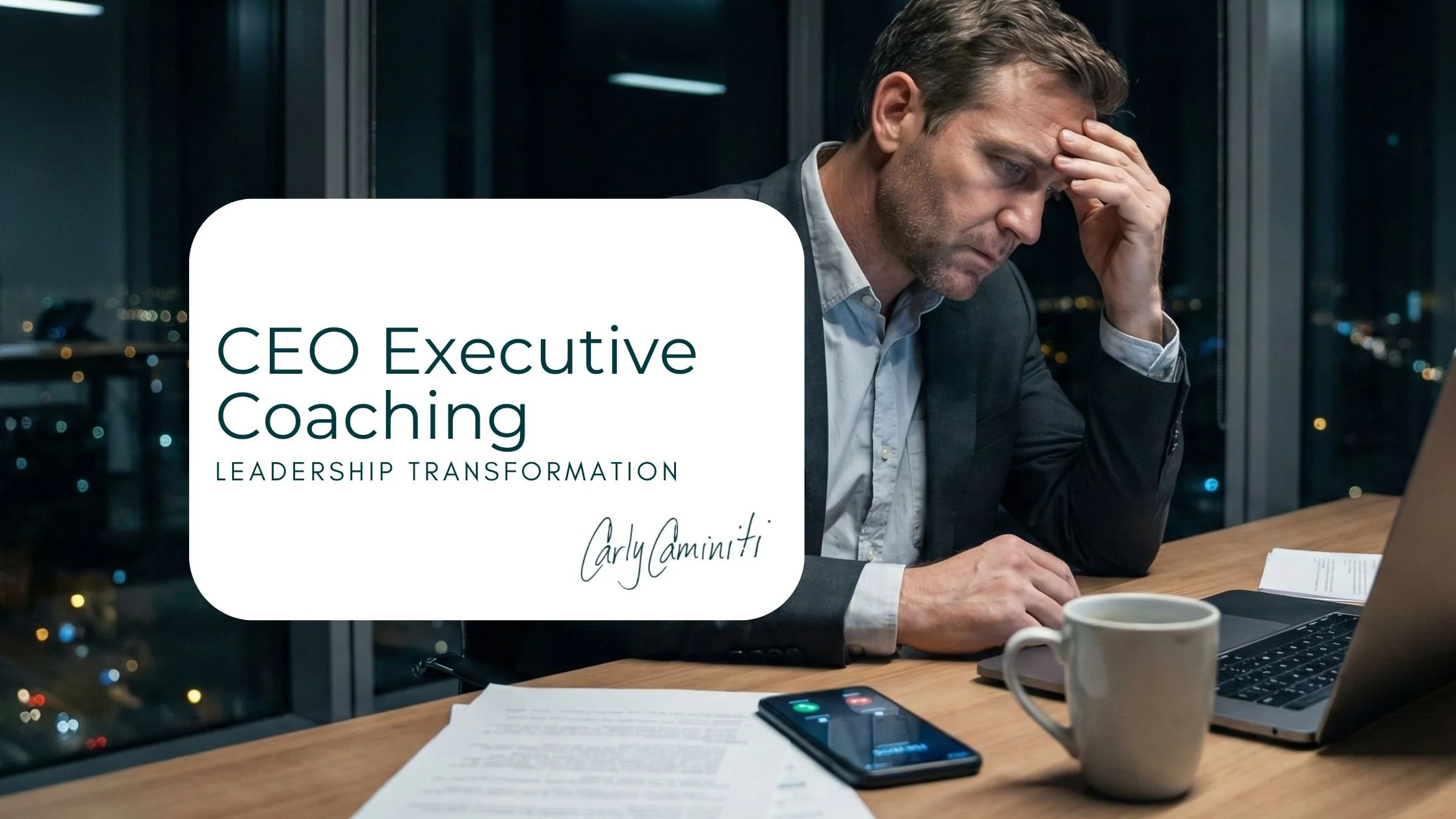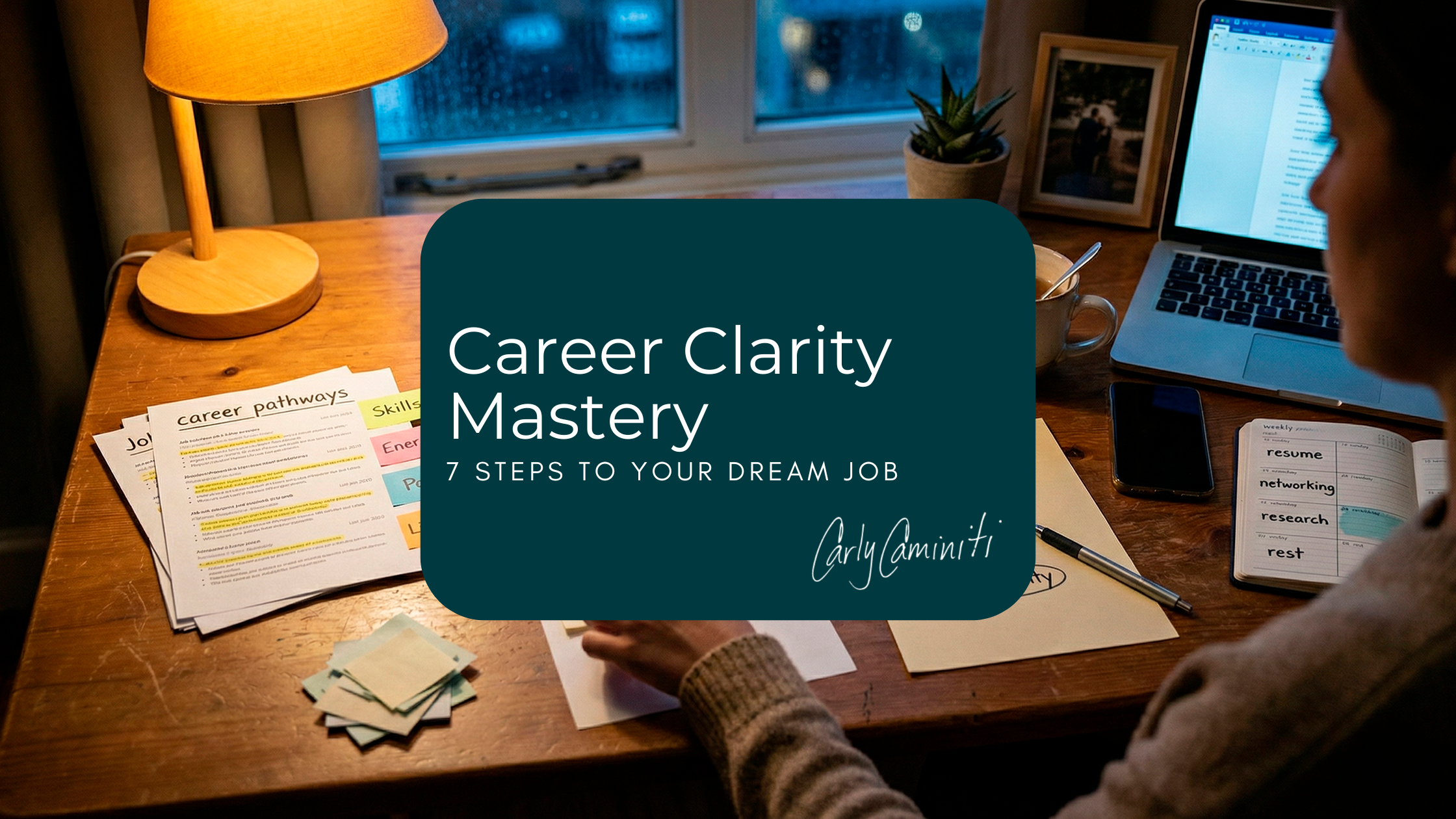How to Choose the Best Executive Coach for You
Choosing the right executive coach isn’t about credentials on a website, it’s about finding the partner who will actually shift how you lead, decide, and show up under pressure. The wrong fit wastes time and money. The right fit can change your entire trajectory.
At Carly Caminiti Coaching, I help executives cut through the noise, build the skills that matter, and finally see results in how they lead and live. This guide will show you exactly what to look for in an executive coach, so you make an investment that pays off in confidence, clarity, and measurable impact.
Also Read:
Table of Contents
TL;DR
The best executive coach for you will align with your goals, match your communication style, bring proven experience, and earn your trust. Focus on accreditation (ICF/EMCC), industry knowledge, and chemistry during consultations. Ask pointed questions, check references, and avoid quick-fix promises. The strongest partnerships deliver ROI in performance, credibility, and career growth.
Key Points
Get Clear First: Define specific leadership goals and blind spots before you even search.
Style Fit Matters: Pick a coaching style (direct vs exploratory, structured vs flexible) that works with how you learn.
Credentials + Context: Look for ICF/EMCC certifications and real-world executive or industry experience.
Track Record: Only consider coaches with proven success working at your leadership level.
Chemistry Is Critical: A good first conversation should feel balanced, safe, and productively challenging.
Vetting Saves You: Check references, review testimonials, and confirm ethical/confidentiality policies.
Avoid Mistakes: Don’t choose on cost alone, ignore chemistry, or rush the process.
Get Clear on What You Need From Coaching
Define Your Leadership Development Goals
Before you start your search for how to select an executive coach, invest time in honest self-reflection about what you want to achieve. Today's executives prioritize developing their ability to inspire, guide, and communicate clearly with their teams, focusing on active listening, constructive feedback, and communication that builds trust and engagement.
Your coaching goals might center on developing strategic vision and the ability to make data-informed decisions, especially crucial in rapidly changing business environments. Many leaders seek coaching for managing workplace conflicts and navigating sensitive conversations professionally. Others focus on emotional intelligence—including self-awareness, empathy, and managing emotions under pressure.
Consider whether you need help with delegation and empowerment, enabling distributed leadership for faster execution. Some executives target digital fluency, developing competencies in technology adoption and leveraging AI to enhance decision-making. The key lies in establishing concrete, measurable objectives that will guide both your coach selection process and the coaching engagement itself.
Recognizing Your Current Challenges and Blind Spots
Effective coaching begins with acknowledging areas where you need support. This honest assessment helps you communicate your needs clearly when interviewing potential coaches. Common executive challenges include managing imposter syndrome, overcoming perfectionism that slows decision-making, or developing confidence in unfamiliar business domains.
External challenges often involve leading through organizational change, building high-performing teams, or navigating complex stakeholder relationships. You might struggle with work-life integration, especially as responsibilities expand, or find difficulty inspiring teams during challenging periods. One successful case involved a senior executive leading through organizational change who struggled with resilience and adaptability during major restructuring, ultimately maintaining team engagement throughout the transition after targeted coaching interventions.
Your blind spots represent the greatest coaching opportunities. These might include communication patterns that inadvertently undermine team morale, decision-making biases that limit strategic thinking, or leadership habits that worked at previous levels but now hinder your effectiveness. A skilled coach helps identify and address these gaps through assessment tools and structured feedback processes.
Decide the Coaching Style That Works for You
Understanding your preferred learning and communication style significantly impacts coaching success. Some executives thrive with direct, challenging feedback that pushes them outside their comfort zones. Others prefer a more exploratory approach that guides them toward their own insights through thoughtful questioning.
Consider your personality and past experiences with mentors or advisors. Do you respond well to structured frameworks and action plans, or do you prefer flexible conversations that adapt to emerging issues? Your comfort with vulnerability also matters, as transformational coaching requires openness about weaknesses and uncertainties.
Think about practical preferences too. Some executives benefit from intensive, focused sessions, while others prefer shorter, more frequent check-ins. Virtual coaching has become increasingly effective, though some leaders still prefer in-person interactions for building deeper rapport. Your schedule and travel demands will influence these decisions.
What to Look For in a Coach's Background
Professional Coaching Certifications and Training
When evaluating how to hire an executive coach, professional credentials serve as your first quality filter. The International Coaching Federation (ICF) provides the industry's gold standard certifications: Associate Certified Coach (ACC) requires 60 hours of coach-specific training and 100 hours of experience. (Side note: my program required 343 hors of training, not 60).
These credentials ensure your coach has received proper training in coaching competencies, ethics, and methodology. However, organizational psychology researchers highlight important limitations. As noted in recent studies, coaching faces persistent challenges including "an unclear definition of coaching, lack of theoretical underpinnings, diversified outcomes, and questionable research methodologies." Leading researchers observe that "coaching is a practice in search of a theory", emphasizing the importance of selecting coaches who combine formal credentials with proven practical results.
Track Record with Executives at Your Level
The complexity and stakes of executive leadership require coaches experienced with similar roles and challenges. A coach who primarily works with mid-level managers may struggle to understand C-suite pressures, board relationships, or the isolation that often accompanies senior leadership positions.
Research shows that 77% of executive coaching clients report significant impact in at least one key business metric, but this success depends partly on the coach's familiarity with executive-level challenges.
Ask potential coaches about their typical client profile, the seniority levels they've worked with, and specific outcomes they've helped achieve. Don't hesitate to request anonymized case studies or examples of how they've helped executives navigate situations similar to yours.
How to Evaluate Coaching Methods
Understanding Different Coaching Frameworks
Professional executive coaches should clearly articulate their methodology and explain how it supports your development goals. Leading frameworks include the CLEAR Model (Contracting, Listening, Exploring, Action, Review), which builds trust and creates safe spaces for reflection while delivering measurable behavioral change. The FUEL Model (Frame, Understand, Explore, Lay Out) structures action-oriented coaching for career advancement and performance improvement.
The OSCAR Model (Outcome, Situation, Choices, Actions, Review) provides structured yet flexible goal-setting and accountability, while the Coaching Effectiveness Framework emphasizes the coaching relationship itself as the central driver of outcomes. Recent meta-analyses show that executive coaching most strongly affects behaviors, particularly cognitive behaviors, compared to attitudes or personality traits.
Effective coaches often combine multiple frameworks, adapting their approach to your specific needs and preferences. Be wary of coaches who rigidly adhere to a single methodology without considering your unique situation or learning style. The efficacy of coaching appears independent of number or length of sessions, except for some improvement in attitudes with longer programs.
Assessment Tools and Diagnostic Methods
Modern executive coaching leverages sophisticated assessment tools to accelerate self-awareness and track progress. Leading coaches use behavior-focused leadership assessments like the Velocity Leadership CheckPoint, which evaluates 25 leadership traits across Alignment, Achievement, Awareness, Altitude, and Adaptability, enabling granular tracking of coachable behaviors.
The Leadership Circle Profile provides insights into both creative strengths and limiting reactive tendencies, supporting deeper self-awareness and measurable behavioral shifts. Personality and strength assessments such as Tilt 365, CliftonStrengths, DiSC, or 16Personalities help identify and leverage natural talents in executive roles.
A practical example involves a CFO at a healthcare private equity company who excelled in accounting but lacked financial planning and strategic vision. Executive coaching expanded her operational focus and leadership vision, integrating FP&A into her function and widening team accountability, ultimately enabling her to deliver actionable insights for private equity partners while elevating both team and company performance.
Goal-Setting and Progress Measurement Systems
Accountability drives coaching success, making progress measurement systems crucial for evaluating potential coaches. Studies tracking "hard" ROI estimate direct financial benefits between $200,000 and $500,000 per coached executive, but achieving these results requires systematic measurement and tracking.
Look for coaches who emphasize SMART goals (Specific, Measurable, Achievable, Relevant, Time-bound) and use tracking mechanisms that align with your organizational objectives. They should explain how they integrate feedback from stakeholders, such as 360-degree assessments, peer input, or board feedback.
The best coaching engagements include periodic progress reviews that assess both goal achievement and the coaching relationship itself. This ensures the partnership remains productive and allows for adjustments as your needs evolve or circumstances change.
The Chemistry Check: Fit is Everything
What a Strong First Conversation Should Feel Like
The initial consultation reveals whether you and a potential coach can build the trust necessary for transformational work. A strong conversation feels balanced, with both parties asking thoughtful questions and sharing openly. You should sense the coach's genuine interest in understanding your challenges, goals, and context.
Pay attention to how the coach listens. Do they ask follow-up questions that demonstrate understanding? Do they reflect back what they've heard in ways that provide clarity? The conversation should challenge you gently while maintaining a respectful, supportive atmosphere.
Good coach-client chemistry involves productive tension where the coach can constructively confront assumptions and encourage fresh perspectives without undermining the relationship. You should leave the session feeling understood, slightly challenged, and motivated to continue the conversation.
Key Questions to Ask During Initial Consultations
Your questions to ask an executive coach should reveal their experience, methodology, and fit with your needs. Start with: "What is your experience as an executive coach, and what types of executives and industries have you worked with?" This establishes their relevant background and client base.
Ask "Which methodologies or frameworks do you use, and how do they support leadership development?" to understand their approach and ensure alignment with your preferences. "How do you distinguish mentoring from coaching?" reveals their clarity about role boundaries and expectations.
Explore their process with questions like "How do you assess and help identify my blind spots as a leader?" and "How do you measure the effectiveness of your coaching interventions?" Request specific examples: "Can you describe a successful case where you helped an executive overcome a significant challenge?"
Address practical concerns too: "What can I expect as a result of the coaching engagement, and how are objectives determined?" and "What strategies do you use to ensure confidentiality?" These questions help establish mutual expectations and trust.
Red Flags and Warning Signs to Avoid
Certain warning signs indicate coaches you should avoid. Be cautious of those who lack proper credentials, provide vague descriptions of their process, or seem reluctant to share references or examples of their work. Poor communication skills during initial meetings often predict future challenges.
Watch for inflexibility in coaching style or unwillingness to adapt their approach to your specific needs. Coaches who dominate conversations, fail to ask insightful questions, or seem more interested in selling their services than understanding your challenges raise concerns about their coaching abilities.
Be wary of unrealistic promises about outcomes or timeframes. Effective coaching requires time and sustained effort, so coaches who guarantee rapid transformation or dramatic changes may lack experience or integrity. Similarly, avoid coaches who pressure you into quick decisions or seem uncomfortable discussing their methodology transparently.
Understanding When Coaching Isn't the Right Solution
Psychological professionals emphasize that coaching requires sufficient ego strength and emotional stability. As experts note, "if you can't assume sufficient ego strength, then you need to ask whether or not this really is the time and place for executive coaching", suggesting that individuals with underlying psychological issues may need therapeutic assistance rather than coaching.
Coaching works best when leaders are fundamentally healthy but seeking growth and development. It's not designed to address deep-seated psychological issues, substance abuse problems, or severe interpersonal difficulties that require clinical intervention. Sometimes, as coaching professionals acknowledge, "the best work I can do with a coaching client is to advise him that he needs to seek out therapeutic assistance".
Consider alternative solutions when facing organizational politics without leadership support, severe time constraints that prevent meaningful engagement, or resistance to feedback and change. These situations often require systemic interventions beyond individual coaching.
Vetting and Making the Final Call
Checking References and Client Testimonials
Reference checks provide crucial insights into a coach's effectiveness and working style. Request contacts for executives with similar backgrounds, challenges, or goals. Prepare specific questions about the coach's professionalism, ability to maintain confidentiality, and success in driving meaningful change.
Ask references about the coach's communication style, reliability, and adaptability to changing needs. Inquire about specific outcomes achieved and whether they would work with the coach again or recommend them to colleagues. These conversations often reveal insights not apparent during initial consultations.
Verifying Professional Background and Success Stories
Due diligence involves confirming credentials, experience claims, and professional standing. Verify ICF certifications through official directories. Research the coach's professional history, previous roles, and any public contributions to the coaching field such as articles, speaking engagements, or thought leadership.
Look for consistency between their stated experience and their online presence, testimonials, and case studies. Reputable coaches often have established reputations, client testimonials, and evidence of ongoing professional development through conferences, training, or association memberships.
Be cautious of coaches who make inflated claims about results or seem reluctant to provide verifiable information about their background. Transparency about their career path and areas of expertise indicates integrity and confidence in their qualifications.
Understanding Their Ethical Standards and Confidentiality Policies
Executive coaching involves sensitive information about leadership challenges, organizational dynamics, and personal development areas. Ensure your potential coach maintains strict confidentiality standards and adheres to established ethical codes from organizations like ICF or EMCC.
Discuss their policies regarding information sharing, data protection, and boundaries around coaching relationships. Clarify expectations about what information might be shared with organizational sponsors and under what circumstances.
Review their coaching agreement carefully, paying attention to confidentiality clauses, termination procedures, and ethical guidelines. Professional coaches should willingly explain their practices and provide clear documentation of their ethical standards and boundary management.
Common Mistakes to Avoid When Choosing an Executive Coach
One of the most significant mistakes when selecting an executive coach involves focusing only on certifications instead of proven competency and relevant experience. While credentials matter, they don't guarantee effectiveness with your specific challenges or industry context. Balance formal qualifications with demonstrated results and relevant background.
Ignoring coaching chemistry represents another critical error. Some executives choose based solely on credentials or cost, overlooking the interpersonal dynamics essential for successful coaching relationships. Research shows strong correlation between relationship quality and outcomes, making personal fit as important as professional qualifications.
Failing to clarify your specific coaching needs before starting your search leads to mismatched partnerships. Without clear objectives, you cannot evaluate whether a coach's expertise aligns with your goals or measure progress effectively. Generic coaching programs often fail because 82% of middle-market companies report that standard leadership programs don't meet their specific needs.
Treating executive coaching as remedial intervention rather than developmental opportunity creates stigma and reduces engagement. When coaching addresses performance issues instead of growth potential, both coach and client approach the relationship with different expectations and energy levels.
Other common mistakes include overlooking organizational culture alignment, choosing coaches with rigid methodologies, and rushing the selection process without adequate research or chemistry meetings.
Maximizing Your Investment: How to Be a Great Coaching Client
Approach coaching with clarity about your goals and openness to challenging conversations. Be honest about obstacles, ambitions, and weaknesses, as authenticity enables your coach to provide targeted support. Embrace feedback and data-driven insights, using assessment results and progress measurements to guide your development.
Prioritize wellbeing and resilience alongside performance goals. Modern executive coaching increasingly integrates stress management and work-life boundaries into development plans, recognizing that sustainable leadership requires attention to both professional and personal dimensions.
Follow through consistently on actions and commitments made during coaching sessions. Translate insights into concrete behaviors and practice new approaches between meetings. Regular application and reflection accelerate progress and demonstrate your investment in the process.
Maintain a growth mindset throughout the engagement, viewing challenges as learning opportunities rather than failures. Cultivate continuous feedback loops with your coach, providing input about what works well and what needs adjustment. This collaborative approach ensures the coaching relationship evolves to meet your changing needs and circumstances.
Remember that effective coaching requires time and sustained effort. Be patient with the process while maintaining accountability for your own development. The most successful coaching clients treat their coach as a thought partner in ongoing leadership development rather than a consultant providing quick fixes to immediate problems.
Conclusion
The wrong executive coach can leave you spinning your wheels, wasting budget, and still second-guessing your leadership. The right coach accelerates growth, sharpens your decision-making, and makes you the leader your team actually wants to follow.
If you’re serious about finding that kind of partnership, Carly Caminiti Coaching helps high-achieving professionals cut through the overwhelm and choose a path that actually works. Don’t wait until burnout or stalled growth forces the issue. Book a discovery call today and take control of your next chapter as a leader.








